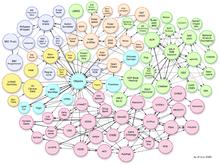Linked Data and RDFa
5:35 pm in workshops by b.kelly
As part of the recent government announcement on IT cutbacks the Department for Business, Innovation and Skills announced that it is to cut funding for the Institute of Web Science at Southampton University, worth £5 million this year. Despite this news, Tim Berners-Lee has suggested that the “Web Science future is bright” and pointed out that:
“It is clear from the new Government’s Big Society declaration, the Coalition Partnership and speeches such as David Cameron’s to TED before the election that open government data is a high priority. Our understanding is that the data.gov.uk portal will in fact grow significantly in the months to come.“
The importance of open access to data funded by the public is, of course, applicable to the higher education sector as well as central and local government. An understanding of the relevance of recent technological developments such as Linked Data and RDFa will therefore be important for those with responsibilities for opening up access to institutional data.
At this year’s event we are featuring two workshop sessions which address this topic:
- Adrian Stevenson, Thom Bunting and Mark Dewey will facilitate a session on “RDFa from theory to practice which ”will introduce the concepts of Linekd Data and RDFa and provide examples of applications which can be used to produce and consume RDFa Web resources”.
- The following day participants at a session on “Looking at Linked Data facilitated by Chris Gutteridge “should come away from the session with an idea of what is and is not practical, and some of the technical and political issues involved in providing useful Linked Data“.
We have scheduled these two sessions to be held on different days so that participants wishing to quickly gain an understanding of developments in this area will be able to do as at this year’s event.
NOTE I have just spotted that BBC News item published earlier today which informs us that “David Cameron to make more government data available“. David Cameron is quoted as saying that “So we’re going to rip off that cloak of secrecy and extend transparency as far and as wide as possible. By bringing information out into the open you’ll be able to hold government and public services to account“. I feel that it will be important for Universities to be pro-active in ensuring that their data is open and available for reuse by others.


